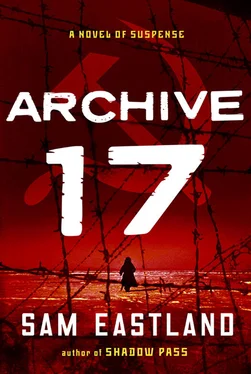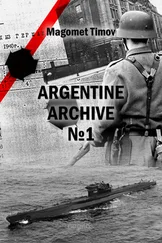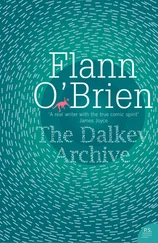Sam Eastland - Archive 17
Здесь есть возможность читать онлайн «Sam Eastland - Archive 17» весь текст электронной книги совершенно бесплатно (целиком полную версию без сокращений). В некоторых случаях можно слушать аудио, скачать через торрент в формате fb2 и присутствует краткое содержание. Жанр: Исторический детектив, на английском языке. Описание произведения, (предисловие) а так же отзывы посетителей доступны на портале библиотеки ЛибКат.
- Название:Archive 17
- Автор:
- Жанр:
- Год:неизвестен
- ISBN:нет данных
- Рейтинг книги:3 / 5. Голосов: 1
-
Избранное:Добавить в избранное
- Отзывы:
-
Ваша оценка:
- 60
- 1
- 2
- 3
- 4
- 5
Archive 17: краткое содержание, описание и аннотация
Предлагаем к чтению аннотацию, описание, краткое содержание или предисловие (зависит от того, что написал сам автор книги «Archive 17»). Если вы не нашли необходимую информацию о книге — напишите в комментариях, мы постараемся отыскать её.
Archive 17 — читать онлайн бесплатно полную книгу (весь текст) целиком
Ниже представлен текст книги, разбитый по страницам. Система сохранения места последней прочитанной страницы, позволяет с удобством читать онлайн бесплатно книгу «Archive 17», без необходимости каждый раз заново искать на чём Вы остановились. Поставьте закладку, и сможете в любой момент перейти на страницу, на которой закончили чтение.
Интервал:
Закладка:
“Your accent puts you east of the Urals,” Pekkala continued, “probably in the vicinity of Perm. You are old enough to have fought in the war, and from the cut of your hair”-he nodded towards Melekov’s flat-topped stand of gray bristles, in the style known as en brosse -“I am guessing that you did.”
“Yes, that’s all true, but-”
“So you were a Russian soldier, and yet you have been wounded by a Russian bayonet. Therefore, you were wounded by one of your own countrymen.” Pekkala paused, studying the emotions on Melekov’s face, which passed like the shadows of clouds over a field as the cook relived his past. “You did not receive your wound during the war, but rather in the Revolution which followed it.”
“Very good, convict, but which side was I fighting for?”
“You were not with the Whites, Melekov.”
Melekov turned his head and spat on the floor. “You’ve got that right.”
“If you were,” said Pekkala, “you would more likely be a prisoner here than someone who is on the payroll. And I have not seen you speaking to the Comitati, which you would do if you were one of them.”
Melekov held out his fists, knuckles pointing upwards. “No pine tree tattoos.”
“Exactly. Which means you fought for the Bolsheviks, and because you were a horseman, I believe you were in the Red Cavalry.”
“The Tenth Brigade …”
“You were injured in an attack against infantry, during which one of the enemy was able to stab you with a bayonet as you rode past. A wound like that is very serious.”
“I almost died,” muttered Melekov. “It was a year before I could even walk again. I could not even leave the hospital because the leg kept getting infected.”
“And since you’ve already told me that you’ve never left Siberia, that must be where you were injured. I believe you must have been fighting against the forces of General Semenov or Rozanov, the White Cossacks, who waged their campaigns in this part of the world.” When Pekkala had finished, he slumped in his chair, feeling the tingle of sweat against his back. If even one detail was wrong, the minutes he had spent unraveling the mystery of Melekov’s crucifix scar would do more harm than good.
For a long time Melekov was silent, his face inscrutable. Then, suddenly, he stood. His chair fell over backwards and landed with a clatter on the floor. “Every last word of what you’ve said is true!” he shouted. “But there is one more thing I’d like to know.”
“Yes?”
“I would like to know who the hell you really are, convict.”
This was the moment Pekkala had been waiting for. If Klenovkin had been right that Melekov was the worst gossip in the camp, all Pekkala had to do was speak his name, and it would not be long before the Comitati knew that he was here. “I was known as the Emerald Eye.”
Melekov’s eyes opened wide. “Do you mean to tell me you are the tree-marker who lasted all those years and then suddenly disappeared? But I thought you were dead!”
“Many people do.” Pekkala’s fingers inched forward, reaching like the tentacles of an octopus until they closed around the egg.
This time Melekov did nothing to prevent him.
The cracked shell seemed to sigh in Pekkala’s grip. Hunched over the table, he plucked away the tiny fragments, which fell to the table like confetti. He sank his teeth through the slick rubbery white and bit into the hard-boiled yolk.
At sunrise the next day, the gates of Borodok swung open and a band of heavily armed men entered the compound. They were short and swathed in furs, their wide Asiatic faces burned brick red by the wind.
The men brought with them a sled pulled by reindeer, on which lay half a dozen bodies, each one solid as stone.
Melekov and Pekkala stood in the doorway of the kitchen, handing out rations.
“Ostyaks,” whispered Pekkala.
“That must be the last of the prisoners who tried to escape before you arrived at the camp. Gramotin will be happy now. Or at least less miserable than usual.”
One of the fur-clad men set aside his antiquated flintlock rifle and stepped into Klenovkin’s office. The others glanced warily at the camp inmates who had paused in the breadline to witness the spectacle. A minute later, the Ostyak emerged from Klenovkin’s hut, carrying two burlap sacks stuffed full as pillows.
The bodies were dumped off the sled. Borodok guards opened the gates and the Ostyaks departed as suddenly as they had arrived, leaving behind the grotesquely frozen corpses.
“Come on, Tarnowski!” Gramotin shouted at the convicts. “You know what to do. Find your men and put these carcasses beside the generators. I want them thawed out by the end of the day.”
Taking hold of frozen limbs as if they were the branches of a fallen tree, the Comitati carried the corpses over to a building where the electrical generators were housed.
“Why does he force the Comitati to do that job?” Pekkala asked Melekov.
“Force them?” Melekov laughed. “That job is a privilege. The Comitati fought for it until no one else would dare take it from them, not even Gramotin.”
“But why?”
“Because the generator room is the warmest place in this camp. They take their time laying out those bodies, believe me, and thaw themselves out a little as well.”
“What’s the reason for thawing out the bodies?”
“It’s the only way they can get them into the barrels.”
By the time the Comitati reappeared, the breadline had begun to move again, but no sooner had Pekkala begun distributing the rations than a fight broke out among the prisoners.
Pekkala had been so focused on handing out the bread that he did not see who started it.
Those convicts not involved fell back from the commotion, leaving an old man, whom Pekkala immediately recognized as Sedov, down on one knee and wiping a bright smear of blood from his nose.
Above him stood Tarnowski. With fists clenched, he circled the old man like a boxer waiting for his opponent to raise himself up before knocking him down once more.
Pekkala remembered what Klenovkin had said about the Comitati turning against each other. From what he could see, it appeared to be the truth.
Sedov climbed shakily to his feet. He was upright for only a second before Tarnowski smashed him again in the face. Sedov spun as he tumbled, his teeth limned in red, but no sooner was he down than he began to get up again.
“Stay down,” muttered Pekkala.
Melekov grunted in agreement. “They never learn. I told you.”
As he watched the Old Believer struggle to his feet, Pekkala could stand it no longer. He walked towards the door which led out to the compound.
“What are you doing?” barked Melekov.
“Tarnowski’s going to kill him.”
“So what if he does? He’ll kill you as well if you get in his way.”
Pekkala did not reply. Opening the flimsy door, he strode into the compound and pushed his way into the circle where the fight was taking place.
Tarnowski was just about to strike the old man another blow when he caught sight of Pekkala. “Get out of the way, kitchen boy.”
Pekkala ignored him. Turning to help the injured man, he was astonished to see that the place where Sedov had been lying was now empty. The only thing remaining was some splashes of blood in the snow. The Old Believer seemed to have vanished into the crowd.
“Look out!” shouted a voice in the crowd.
Glancing at the blur of dirty faces, Pekkala caught sight of Savushkin.
Too late, Pekkala spun around to meet Tarnowski.
That was the last thing he remembered.
On the other side of the country, Poskrebyshev had just arrived for work.
As he did every day, he entered the Kremlin through the unmarked door that led directly to an elevator, which was also unmarked. This elevator had only two buttons, UP and DOWN, and brought him directly to the floor on which Stalin’s office was located.
Читать дальшеИнтервал:
Закладка:
Похожие книги на «Archive 17»
Представляем Вашему вниманию похожие книги на «Archive 17» списком для выбора. Мы отобрали схожую по названию и смыслу литературу в надежде предоставить читателям больше вариантов отыскать новые, интересные, ещё непрочитанные произведения.
Обсуждение, отзывы о книге «Archive 17» и просто собственные мнения читателей. Оставьте ваши комментарии, напишите, что Вы думаете о произведении, его смысле или главных героях. Укажите что конкретно понравилось, а что нет, и почему Вы так считаете.











